MIT SCHOOL OF HUMANITIES, ARTS, AND SOCIAL SCIENCES
Media + Awards Digest | September 2021
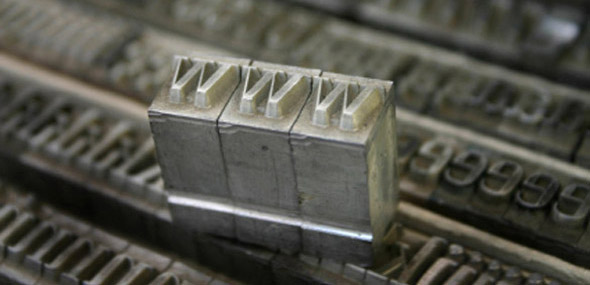
The Media + Awards Digest is a section of the Said and Done newsletter. Subscribe
Office of the Dean | 23 September 2021
Dear Friends,
Welcome back to campus! The start of this academic year is particularly special, as many of us return to offices and colleagues we have sorely missed. We give profound thanks to those across the Institute who have made this return possible and who continue to work to keep our community safe.
To launch the fall season, here is a sampling of contributions from MIT's humanistic fields to the media and other public forums.
As examination continues of the outstanding voting and election administration successes of the 2020 election — as well as the anti-democracy actions, lies, and threats that endangered it — MIT election expert and political scientist Charles Stewart III provided analysis to The Guardian and appeared on MSNBC’s Rachel Maddow Show. Locally, Stewart also offered perspective on the Boston mayoral contest’s mail-in balloting for The Boston Globe.
The post-pandemic era is ushering in a new era for how we work. With a guest essay in The New York Times, Ford Professor of Economics David Autor argues that the current U.S. labor shortage is due primarily to workers rejecting low-quality jobs. Also covered by The New York Times and elsewhere, a significant JPAL-funded study documents extensive racial discrimination in the hiring practices of the largest American companies.
The geopolitics of the Biden era are now taking shape, with a marked Asia-Pacific focus. Commenting in a New Republic essay on discoveries since 9/11, security strategist Barry Posen notes the environment for U.S. foreign and defense policy interests. Appearing on NPR’s The World, political scientist and leading security analyst M. Taylor Fravel explains the new U.S.-Australia shared security arrangement.
Finally, anthropology professor Christine Walley and filmmaker Chris Boebel announced a new interactive website on the history of Southeast Chicago’s steel mill community: the Southeast Chicago Archive & Storytelling Project is a dazzling labor of love, scholarship, and design. With oral history documentaries, and a rich archive of artifacts, photographs, and films, the website provides a working-class perspective of a transformative period, sparking insight for a national conversation about the nature of work, the value of community — and the future of America.
Our very best for a successful and rewarding fall term.
MIT SHASS Communications
HONORS & AWARDS
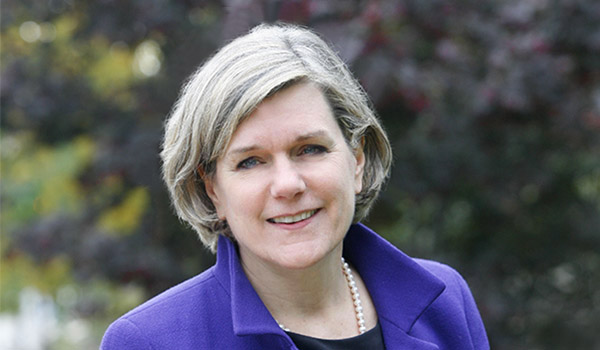
Nancy L. Rose (PhD '85), the Charles P. Kindleberger Professor of Applied Ecomomics at MIT; photo by Allegra Boverman
ECONOMICS
Nancy L. Rose receives the Carolyn Shaw Bell Award
Rose (PhD ’85), the Charles P. Kindleberger Professor of Applied Economics, has received the Carolyn Shaw Bell Award from the American Economic Association’s Committee on the Status of Women in the Economics Profession. Reflecting on the prize, Rose says, "I’m proud of this award as it speaks to the long tradition MIT Economics has for promoting women. It’s been a great environment for me over my career, and a privilege to pass this along to future generations."
Story at MIT SHASS | Nancy Rose webpage
ANTHROPOLOGY
Amy Moran Thomas receives the Turner Prize for Traveling with Sugar
The Victor Turner Prize for Ethnographic Writing is given by the Society for Humanistic Anthropology for "graceful ethnographic writing which deeply explores its subject and contributes in innovative and engaging ways to ethnography and humanistic anthropology." Traveling with Sugar: Chronicle of a Global Epidemic (UCalPress, 2019) examines the havoc diabetes has caused in Belize and around the globe.
Turner Prize | About the book | Moran Thomas webpage
SCIENCE, TECHNOLOGY, AND SOCIETY
William Deringer wins 2021 Spengler Best Book Prize for Calculated Values
Awarding the annual prize, the History of Economics Society said of Calculated Values: "Exceptionally well written [the book] demonstrates that it was precisely because numbers were morally laden, highly personal, and frankly partisan, that calculation became an authoritative form of public reasoning. As Calculated Values formidably moves between intellectual, economic, political, and cultural history, it calls for a revival of a more heterogenous and straightforward politics of numbers." A Spengler Prize for 2021 was also awarded to Calculation and Morality, by Caroline Oudin-Bastide and Philippe Steiner.
Award announcement | About the book | Deringer webpage | When numbers started counting
LINGUISTICS
Sabine Iatridou named the David W. Skinner Professor of Linguistics
A leading scholar, ambassador for linguistics, and sought-after teacher, Iatridou impresses her colleagues with her keen insight and intuition about the most intricate linguistic patterns and her masterful grasp of crosslinguistic generalizations and exceptions.
| Iatridou webpage
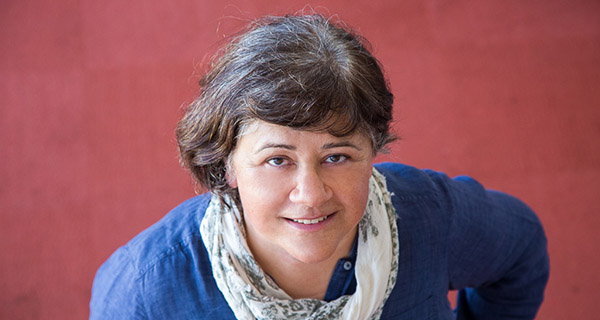
Sabine Iatridou, David W. Skinner Professor of Linguistics; photo by Jon Sachs, MIT SHASS Communications
MEDIA DIGEST
IN MEMORIAM
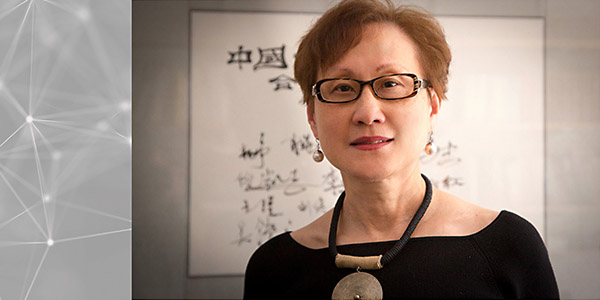
Jing Wang, S.C. Fang Professor of Chinese Languages and Culture; portrait by Jon Sachs
TIMES HIGHER EDUCATION
Jing Wang, 1950-2021
Professor Wang is honored for her career as a literary scholar who became a leading expert in Chinese literature and digital media. Professor Emma Teng of MIT remembers Wang as “an innovator, activist, and passionate teacher” whose “long career was defined by her intellectual curiosity, drive and energy, and unwavering integrity."
Remembrance | Letter from President Reif | Story: Jing Wang and NGO2.0
STRENGTHENING DEMOCRACY
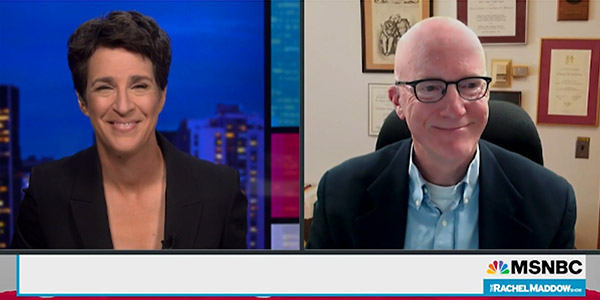
MIT political scientist and election administration expert Charles Stewart III in conversation with Rachel Maddow
MSNBC / THE RACHEL MADDOW SHOW
GOP war on elections threatens civilian stewards of democracy | Charles Stewart III
Stewart talks with Rachel Maddow about the damage being done to the U.S. democratic process by Republicans pushing Donald Trump's Big Lie and targeting America's dedicated election workers in the process. Professor Stewart reiterates that all evidence shows the 2020 election was the most secure in American history and that voting fraud is infinitesimal in U.S. elections.
Conversation at MSNBC | MIT Election Data and Science Lab
THE GUARDIAN
Fight to Vote: Election data reveals the 2020 election was a remarkable success
Charles Stewart, Distinguished Kenan Sahin Professor of Political Science at MIT and an election administration expert, says: “There was great concern about new people not following instructions and having a lot of rejections." But despite the fact that there were double the number of absentee ballots this year, “the percentage of absentee ballots rejected was about what it was in the past.”
Story at The Guardian
MSNBC
California recall was a testing ground for lies about "election fraud"
The incidence of election/voting fraud in the U.S. is infinitesimal. In the last 20 years, about 250 million votes have been cast through mail-in-ballots across the United States. Of that number, Amber McReynolds, CEO of the National Vote at Home Institute, and Charles Stewart, director of the MIT Election Data and Science Lab, estimate the fraud rate at “0.00006 percent of total votes cast.”
Story at MSNBC | MIT Election Data and Science Lab
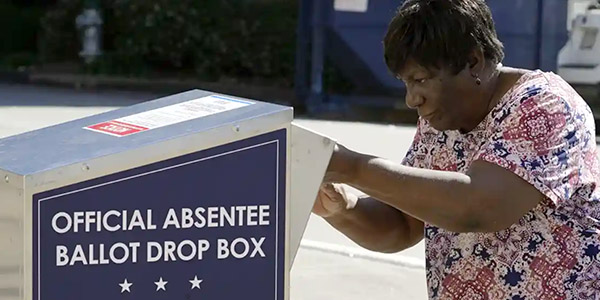
Less than one-third of Americans voted in person on election day in November 2020. Photo: John Bazemore/AP
THE BOSTON GLOBE
Crush of mail-in ballots in Boston surprised officials | Charles Stewart III
In Massachusetts prior to 2016, only 5 percent of ballots were cast by mail, according to Stewart. That figure soared to nearly 42 percent in 2020, when a record 3.6 million ballots were cast by mail.
Story at The Boston Globe
NPR
Democrats now open to new voter ID rules | Charles Stewart III
"Regardless of how you poll, voters like a requirement for photo ID," said Charles Stewart, who leads the MIT Election Data and Science Lab. "It's kind of a no-brainer for a large swath of the American public...including most Democrats."
Commentary at NPR
CNN
Private funding was key in some 2020 elections | Charles Stewart III
Stewart said the reliance on private money for a basic government function did add an "unseemly...bake sales for democracy" element to the 2020 elections. But he said some states seem to be racing to cut off the private funds without also trying to determine what's an adequate level of state funding for elections to run smoothly and appropriating the money to do so.
Story at CNN | MIT Election Data and Science Lab
THE FUTURE OF WORK
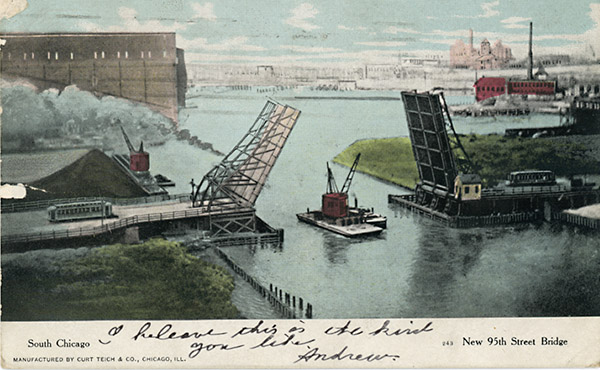
1908 postcard, New 95th Street Bridge; Southeast Chicago Archive & Storytelling Project
FOX 32 CHICAGO
Introducing the Southeast Chicago Archive & Storytelling Project | Christine Walley, Chris Boebel, Jeff Soyk
The recently launched web-based project highlights a remarkable collection of oral history stories, as well as prized objects, photographs, and films preserved by residents of the Southeast Chicago steel mill community, once among the largest industrial corridors in the world. The website project, a labor of love and scholarship, and design, sparks insight for a national conversation about the nature of work, the value of community — and the future of America.
Broadcast interview with Walley | Explore the project | Story at MIT News
REUTERS
As workers age, robots take on more jobs | Daron Acemoglu
“Aging is a huge part of the story” in robot adoption, says economist Acemoglu, an MIT Institute Professor, who conducted the new study with Pascual Restrepo of Boston University.
Story at Reuters
WGBH
Will the future of work leave workers behind? | David Autor
Autor, an MIT economist, predicted that a pandemic-induced recession would be an "automation forcing event," with executives rapidly deploying non-human labor to replace workers, particularly in the service sector — and he was right."
Opinion at WGBH

Detail, illustration by Doug Chayka, The New York Times
ECONOMICS / WORK OF THE FUTURE
Good News: There's a labor shortage | David Autor
"The labor scarcity we’re experiencing is real. But this is an opportunity, not a crisis," says MIT economist Autor, who describes how the current labor shortage provides a remarkable opportunity "to catalyze better working conditions for those who need them most."
Guest essay at The New York Times
THE NEW YORK TIMES
Who discriminates in hiring? A new study can tell | JPAL North America
In a JPAL-funded study, economists at the University of California, Berkeley, and the University of Chicago this week unveiled a vast discrimination audit of some of the largest U.S. companies. Starting in late 2019, they sent 83,000 fake job applications for entry-level positions at 108 companies — most of them in the top 100 of the Fortune 500 list, and some of their subsidiaries. Their insights can provide valuable evidence about violations of Black workers’ civil rights.
Story at The New York Times | JPAL North America
THE NEW YORK TIMES
Inflation could stay high next year, and that’s OK | Daron Acemoglu
"Democracies breed their own support only when they are successful: all of the effects we estimate work through exposure to democracies that are successful in providing economic growth, peace and political stability, and public goods,” write Acemoglu and four other authors.
Story at The New York Times
CRITICAL PERSPECTIVE
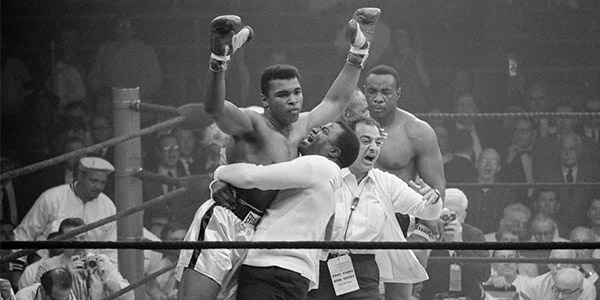
Heavyweight champion Muhammad Ali is lifted in jubilation after his match with boxer Sonny Liston. Ali (then Cassius Clay) defeated Liston in the first round of the May 25, 1965 match to retain his title. Image: Bettmann Archive
FORBES
Muhammad Ali documentary by Ken Burns debuts on PBS | Craig Steven Wilder
Wilder, the Barton L. Weller Professor of History at MIT, joins other leading experts, historians, and writers to provide input on the script and film for the new documentary about Muhammad Ali. A historian of American institutions and ideas, Wilder's most recent book is Ebony & Ivy: Race, Slavery, and the Troubled History of America’s Universities (Bloomsbury, 2013), an acclaimed, award-winning book that has significantly expanded and deepened the national conversation on social justice and the legacy of slavery in the United States.
Story at Forbes | Wilder webpage at MIT History
HEALTHCARE AND WELL-BEING

HEALTHCARE ECONOMICS
The consequences of ending abortion rights | Jonathan Gruber
In the wake of new Texas legislation that effectively bans abortion in that state, MIT health economist Jonathan Gruber discusses research on the connection between the lack of a woman's right to choose and an array of worse lifetime outcomes for children. There are significant personal, familial, and national costs in denying women the right to choose; thus, Gruber points to the duty of states that deny a woman's right to choose to develop social programs that remedy the range of difficult economic, health, and life consequences created by that policy position.
Segment on WGBH | Book: Jump-Starting America
FORBES
Rx for Energy & Commerce’s Healthcare Reconciliation Provisions | Amy Finkelstein
A study by MIT, Harvard, and Dartmouth economists found that the actual value of the Medicaid program to recipients is only about a quarter of its cost. The big winners from Medicaid expansion are insurance companies. Finkelstein “estimated that 60 percent of government spending to expand Medicaid to new recipients ends up paying for care that the nominally uninsured already receive.”
Story at Forbes
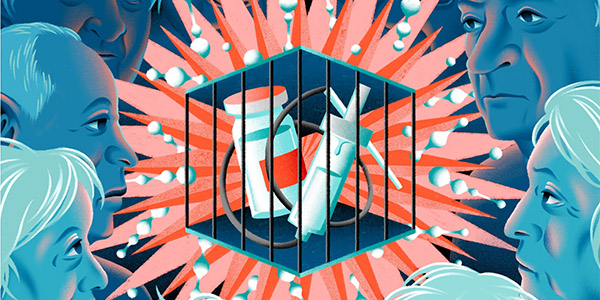
Detail, Illustration by Allison Vu, New York Times
NEW YORK TIMES
That $56,000 drug? Blame Medicare. | Amy Finkelstein
Medicare bases its payments for physician-administered drugs on their average private market price. This seemingly logical approach has the unfortunate consequence of driving up prices — not only for Medicare but also for private payers. Acclaimed MIT health economist Finkelstein writes that "There is a better way: the one that Medicare uses to pay for the familiar prescription drugs dispensed by pharmacies." By changing its policy, Medicare could bring down the price of the most expensive physician-administered drugs by as much as a third.
Commentary at The New York Times
LITERATURE
Literature alumna tackles homelessness in America | Karina O’Malley ’91
O'Malley has helped create two organizations for women and families experiencing homelessness in Washington State. She says the root causes of homelessness across the U.S. are clear — stagnant wages and skyrocketing housing costs — and advocates a dramatic expansion of the Section 8 voucher program, a housing assistance program funded through the Dept. of Housing and Urban Development.
Story at Slice of MIT
CLASSROOM INNOVATION
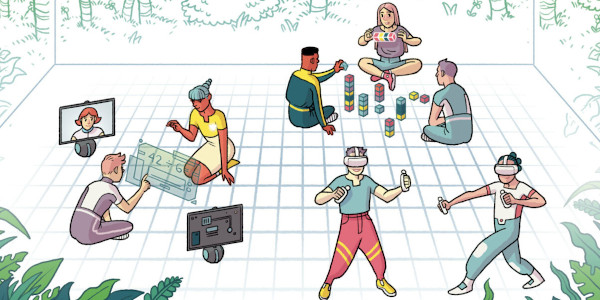
Graphic via Bob Al-Greene for Mashable
MASHABLE
How to build the classroom of the future | Justin Reich
“There are going to be more interruptions in schooling in the future,” says Reich, a professor in the MIT Comparative Media Studies program. “More fires, more floods, more freezing, more pandemic events, more tropical diseases migrating. The West will continue to have terrible fires. When it’s unsafe to travel, kids should be able to switch to remote learning for a week or two.”
Story at Mashable | Justin Reich webpage
SECURITY STUDIES

A musician plays the rubab during a musical performance at the Anab Gull Poetry Festival at the Farah Provincial Governors compound in Farah, Afghanistan. ISAF photo by U.S. Air Force Senior Airman Rylan K. Albright
Why nation building failed in Afghanistan | Daron Acemoglu
“In viewing nation-building as a top-down, ‘state-first’ process, US policymakers were following a venerable tradition,” writes MIT Institute Professor Acemoglu. “The assumption is that if you can establish overwhelming military dominance over a territory and subdue all other sources of power, you can then impose your will. Yet in most places, this theory is only half right, at best; and in Afghanistan, it was dead wrong.”
Commentary in Project Syndicate
POLITICO
South Korea has developed a submarine-launched missile | Vipin Narang
Experts says that Seoul wants such a capability to deter potential attacks from Pyongyang, or at least to have the ability to strike North Korea from a hard-to-track submarine. “A conventional SLBM is crazy expensive but may have a logic (survivable large conventional second strike etc). This is just about the uniqueness of that possibility,” writes Narang, a nuclear expert at MIT.
Story at Politico
POLITICO
North Korea has entered the chat | Vipin Narang
“In the short term, there are meaningful gains to be had by sort of slowing down the growth of [North Korea’s nuclear] program. And Yongbyon gives you an opportunity to do that,” said Narang, a nuclear expert at MIT, noting the nuclear reactor site is North Korea’s only known plutonium and tritium production path.
Story at Politico

A U.S. Marine trapped in a building in Fallujah, Iraq, during fighting in November 2004; via Getty Images
THE NEW REPUBLIC
Twenty years after 9/11, are we any smarter? | Barry Posen, Steven Simon
“It’s an important moment when one significant power is passing or catching up in overall capabilities with another significant power,” said Posen, Ford Professor of Political Science, security strategist, and a leading advocate of a foreign policy forefronting restraint.
Story at The New Republic
THE NEW YORK TIMES
Biden announces defense deal with Australia to counter China | Vipin Narang
“Attack submarines are big deal, and they send a big message. There will be many who say we are giving the Australians a gateway drug for a nuclear capability,’’ Narang said. “It is not something we would let other major allies get away with, much less help make it possible.”
Story at The New York Times
NPR
Historic new security deal for the Asia Pacific region | M. Taylor Fravel
"Under the terms of the historic deal, the US will share nuclear submarine technology with Australia," Fravel said. "The two countries in some ways are in a standoff over what the terms of their future relationship should be."
Story at NPR
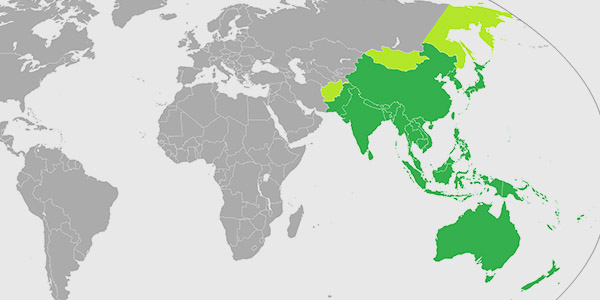
Map of the Asia Pacific region, shown in green
THE WASHINGTON POST
There was no legal way to stop Trump from ordering a nuclear strike | Vipin Narang
From the interview with Narang: Q: Is there anything Milley could do to prevent the president from accessing the launch codes and ordering a nuclear strike? A: The answer is emphatically no. The president alone possesses the sole authority to order a nuclear launch, and no one can legally stop him or her. Despite reports that Pelosi received assurances that there are safeguards in place in the event the president of the United States wants to launch a nuclear weapon, any such meaningful or effective safeguards would be illegal.
Story at The Washington Post
THE NEW YORK TIMES
Did Nazis produce these uranium cubes? | Kate Brown
Brown, the Thomas Siebel Distinguished Professor in History of Science, who teaches environmental and Cold War history at MIT, speculated that Nazi Germany’s production of nuclear weapons probably wouldn’t have had much of an impact on the war. Brown explained that in their quest to produce an atomic bomb, the Germans wanted to use a method in which uranium is submerged in heavy water.
Story at The New York Times | Kate Brown webpage | MIT Program in STS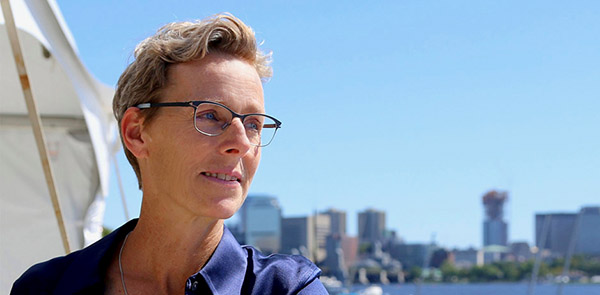
Kate Brown, the Thomas M. Siebel Distinguished Professor in History of Science at MIT
PUBLICATIONS DIRECTORY
A Convenient, One-Page Portal
Here you will find all the online channels, newsletters, and publications produced by the School's 20+ departments, sections, programs, and centers. Look for current research, news, and commentaries from each of the MIT SHASS fields.
Visit the Publications Directory
The Media + Awards Digest is a section
of Said and Done, the School's online digest.
EXPLORE
Follow MIT Now
Updates on the return to campus
Subscribe to Said and Done
10 issues a year
Making a Better World | Research
Browse
Making a Just Society
Explore the Resources
Solving Climate
Browse the Commentaries | MIT Climate Portal
Ethics, Computing, and AI
Full Series
Computing and AI | Humanistic Perspectives
Full Series
Perspectives for the Pandemic
Explore the Series
SHASS on MIT News
Research and Features
MIT Campaign for a Better World
Story | Join Us
Published by MIT SHASS Communications
Office of the Dean, MIT School of Humanities, Arts, and Social Sciences
Editor and Designer: Emily Hiestand
Publication Associate: Alison Lanier
Media Relations Manager: Stephen Oakes
Published 23 September 2021




